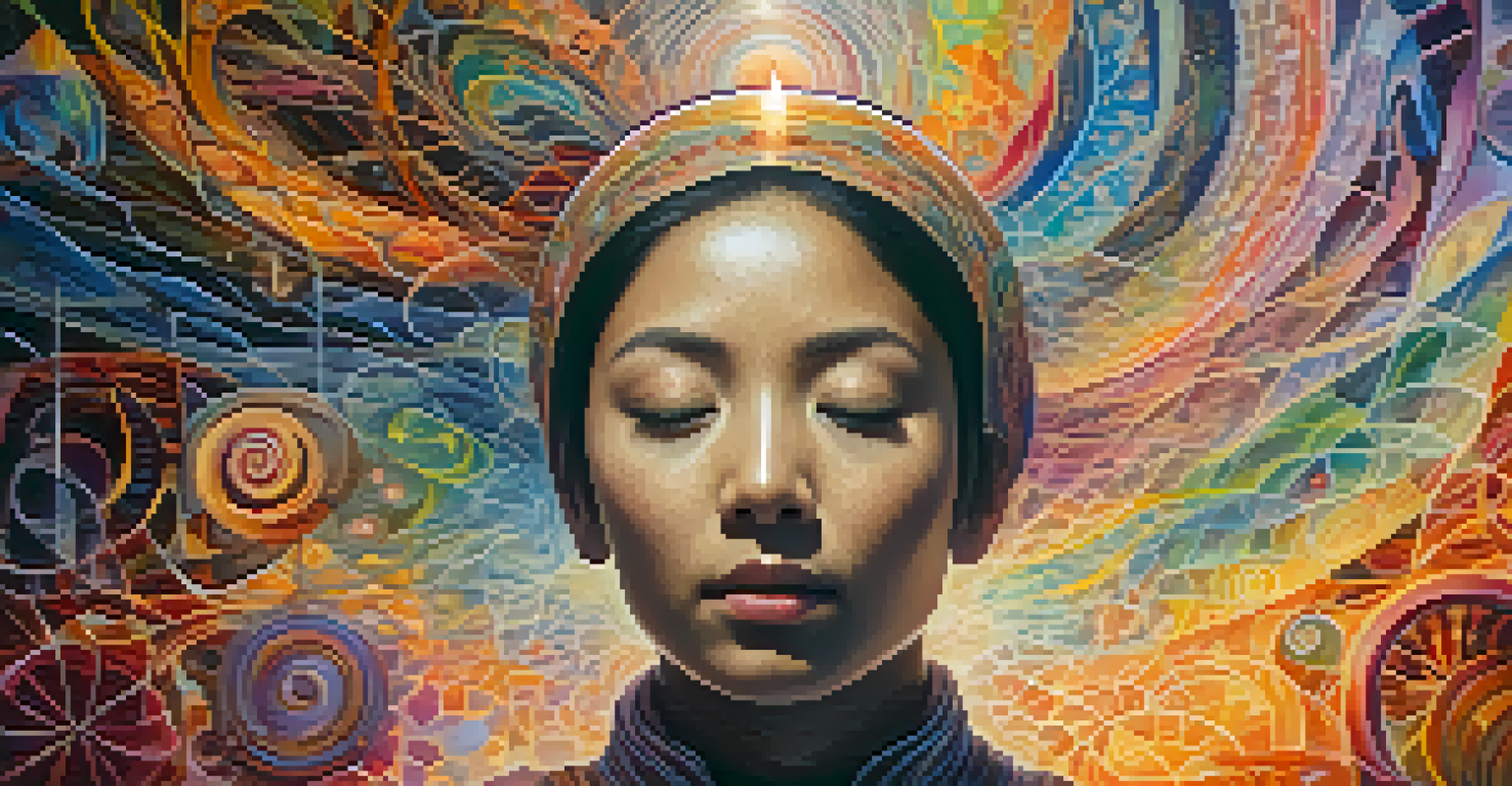The Intersection of Peyote Use and Mental Health in Faith

Understanding Peyote and Its Cultural Significance
Peyote, a small cactus containing the psychoactive compound mescaline, has been used for centuries by Indigenous peoples in North America. Its cultural significance extends beyond mere recreational use, often being tied to spiritual rituals and healing practices. In these contexts, peyote is seen as a conduit for connecting with the divine and gaining deeper insights into oneself and the universe.
Psychedelics are a tool for personal exploration and transformation, offering profound insights into the nature of consciousness and the self.
The traditional use of peyote in Indigenous cultures highlights its role in spiritual ceremonies, where it is believed to facilitate communication with spiritual entities. These rituals often serve as a means of seeking guidance, healing, and personal transformation. For many, the experience of consuming peyote is not just about the psychoactive effects; it's about the profound spiritual journey that accompanies it.
As society continues to explore alternative approaches to mental health, understanding the cultural significance of peyote can provide valuable insights. It offers a unique perspective on how spiritual practices can intersect with mental well-being, particularly in communities where traditional healing methods are prevalent.
The Role of Peyote in Mental Health Practices
Recent studies have begun to explore how peyote and similar substances can influence mental health. Many individuals report therapeutic benefits, such as reduced anxiety and improved mood, after engaging in guided peyote ceremonies. These experiences can lead to profound personal insights, helping individuals to confront and process unresolved emotional issues.

The therapeutic potential of peyote lies in its ability to alter perception and foster introspection. During a peyote experience, users often find themselves reflecting on their lives, relationships, and emotional states. This process can lead to increased self-awareness and a sense of clarity that is often lacking in everyday life.
Peyote's Cultural and Spiritual Role
Peyote is deeply rooted in Indigenous traditions, serving as a spiritual conduit for healing and personal transformation.
However, it is essential to approach the use of peyote with caution and respect, particularly outside of its traditional context. Misuse can lead to adverse psychological effects, making it crucial to engage in these practices under the guidance of experienced facilitators who understand the cultural and spiritual dimensions of peyote use.
Spiritual Experiences and Mental Well-Being
Many who participate in peyote ceremonies report profound spiritual experiences that significantly impact their mental health. These experiences often include feelings of unity with the universe, deep emotional releases, and a sense of belonging. Such moments can foster a greater understanding of one’s place in the world and enhance overall mental resilience.
The therapeutic potential of psychedelics lies in their ability to help us confront our innermost fears and traumas, leading to healing and a renewed sense of self.
The connection between spirituality and mental health is well-documented, with research indicating that spiritual practices can lead to improved emotional well-being. Engaging with peyote in a ceremonial context allows individuals to tap into this connection, potentially leading to transformative psychological changes. This spiritual journey can serve as a powerful healing tool for those grappling with mental health challenges.
Furthermore, the communal aspect of these ceremonies can also play a crucial role in mental health. Sharing experiences with others fosters a sense of support and connection, which is vital for emotional healing. This camaraderie can help individuals feel less isolated in their struggles, reinforcing the positive effects of their spiritual experiences.
Challenges and Misconceptions Surrounding Peyote Use
Despite its potential benefits, misconceptions about peyote and its use often create stigma. Many view peyote solely as a recreational drug, overlooking its deep-rooted spiritual and cultural significance. This misunderstanding can lead to negative perceptions, hindering open conversations about its role in mental health.
Additionally, the legal status of peyote complicates its use outside of traditional contexts. While some Indigenous groups are permitted to use it for religious practices, others face legal repercussions for possession. This disparity can limit access for those who might benefit from its therapeutic properties, raising important ethical questions about cultural appropriation and access to healing methods.
Therapeutic Potential of Peyote
Recent studies suggest peyote may offer mental health benefits, such as reduced anxiety and enhanced self-awareness during guided ceremonies.
Educating the public about the cultural and spiritual dimensions of peyote is crucial for reducing stigma. By fostering a more nuanced understanding of its use, we can encourage respectful dialogue around its potential benefits and challenges, ultimately promoting a more inclusive approach to mental health therapies.
Integrating Peyote into Contemporary Mental Health Practices
As interest in alternative therapies grows, there's a burgeoning conversation about integrating peyote into contemporary mental health practices. This integration requires a careful balance between respecting traditional uses and adapting practices for modern therapeutic settings. Collaboration with Indigenous communities is essential in this process to ensure cultural sensitivity and authenticity.
Mental health professionals are increasingly exploring how psychedelic-assisted therapy, including peyote use, can be beneficial for patients. By incorporating structured, guided experiences, therapists can help individuals navigate their mental health challenges while honoring the rich traditions surrounding peyote. This approach not only enhances therapeutic outcomes but also fosters respect for Indigenous practices.
However, any integration must prioritize safety and informed consent. Understanding the psychological effects of peyote and ensuring that participants are adequately prepared for their experiences is critical. By building a framework that respects both the cultural heritage and the therapeutic potential of peyote, we can open new avenues for mental health treatment.
Personal Stories: Transformative Experiences with Peyote
Personal anecdotes and testimonials provide powerful insights into the transformative potential of peyote. Many individuals share stories of how a single peyote experience helped them overcome deep-seated trauma or anxiety. These narratives often highlight the emotional breakthroughs and clarity that can arise during these spiritual journeys.
For instance, one participant might recount how a ceremony allowed them to confront feelings of grief that had been buried for years. In the safe space created by the ceremony, they were able to process their emotions, leading to a newfound sense of peace and understanding. Such stories underscore the potential of peyote as a tool for personal healing and growth.
Challenges of Peyote Misunderstanding
Misconceptions and legal issues surrounding peyote use create stigma, hindering open discussions about its cultural significance and therapeutic potential.
These transformative experiences, while deeply personal, reflect a broader trend of individuals seeking alternative paths to mental well-being. As more people share their journeys, it helps to normalize the conversation around peyote and its role in mental health, bridging the gap between traditional practices and contemporary therapeutic needs.
Future Directions in Research and Understanding Peyote
The future of peyote research holds great promise, particularly in the context of mental health. As interest in psychedelics grows, researchers are beginning to explore the specific effects of peyote and how it can be applied in therapeutic settings. This research could pave the way for more comprehensive understanding and acceptance of peyote as a legitimate mental health tool.
Ongoing studies aim to clarify the mechanisms behind peyote's effects on mental health, including its impact on brain chemistry and emotional regulation. By gathering empirical evidence, we can better understand how peyote works and who might benefit most from its use. This scientific validation is crucial for integrating traditional practices into contemporary mental health frameworks.

Moreover, as the conversation around psychedelics evolves, it’s important to include Indigenous voices in this dialogue. Their knowledge and experiences can guide ethical practices and ensure that cultural traditions are respected. As we move forward, a collaborative approach can lead to a more inclusive and effective understanding of peyote in the realm of mental health.